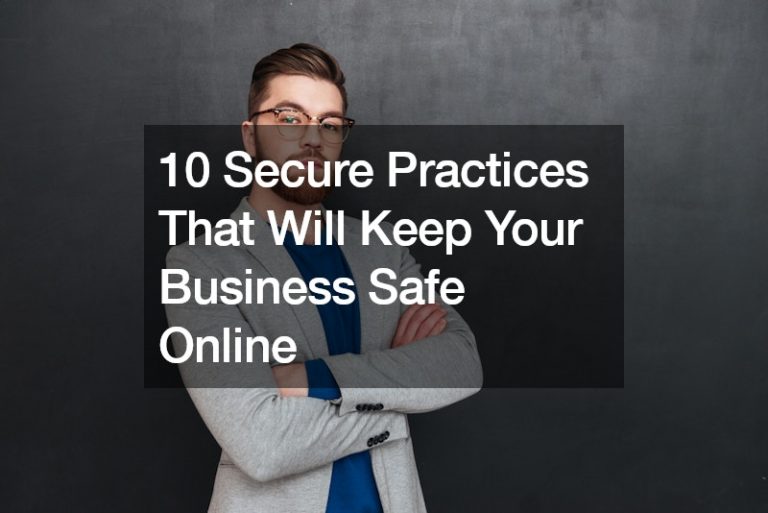In today’s digital jungle, keeping your business safe online isn’t just a good idea — it’s the survival of the savviest. With cyber threats lurking around every virtual corner, adopting a secure practice that works isn’t just a luxury; it’s a necessity. Picture this: with one wrong click or one overlooked update, your business could be in the jaws of cyber chaos. But fear not because we’ve got your back. This article will dive deep into ten secure practices that’ll be your online business’s best buddy, shielding it from the digital dangers creeping in the shadows. Read on, and let’s fortify your online fortress together.
Use Strong Passwords

Here’s the deal: if your password resembles something like ‘123456’ or ‘password,’ you might as well be leaving the front door of your business wide open for hackers to waltz right in. It’s like handing them the keys and a map to your digital kingdom. Hackers are crafty little devils; all it takes is one lucky guess for them to wreak havoc on your business’s online presence.
Before you start sweating bullets, you should know what makes a password worth its weight in digital gold. First, ditch the dictionary words and personal info — hackers aren’t dumb; they’ll surely try your dog’s name and birthdate. Instead, mix uppercase and lowercase letters, throw in some numbers, and sprinkle in a few special characters for good measure. Think of it like crafting a secret code that even the most sophisticated hacking tools struggle to crack.
For example, most of your information is confidential if you run a law firm. Hackers can easily crack your system and find data to wreak havoc on your legal clients. Especially for an accident attorney dealing with sensitive accident details, information leaked to the public can render their case pointless. So, a strong password is necessary to avoid issues like these. Isn’t that what secure practice is all about?
Regularly Update Passwords
Now that you’ve hammered down the importance of having strong passwords, here’s another concern: even the strongest fortress needs a little sprucing up now and then. That’s where regularly updating your passwords comes into play. It’s like giving your digital security a fresh coat of paint, keeping those pesky hackers on their toes.
You might wonder, ‘How often should I hit that reset button?’ Well, think of it like changing the oil in your car — you don’t want to wait until the engine starts sputtering. It’s generally a good idea for businesses to update passwords every few months to keep things nice and spicy. You should also avoid establishing a pattern when scheduling this password change. Try to make it look more spontaneous for those persistent hackers.
For instance, a foundation repair company. They deal with sensitive client information daily, from financial records to project details, especially bigger clients in various industries. Imagine if their passwords haven’t been updated in ages, and a hacker slips through the cracks. Suddenly, confidential client info is out in the wild, lawsuits are flying left and right, and the whole business is on shaky ground. But with regular password updates as part of their secure practice, they can keep their digital foundation strong and sturdy, protecting their clients and their bottom line.
Be Aware of Phishing
Let’s talk about phishing — not the kind where you catch fish, but the sneaky cyber kind that can reel in your business if you’re not careful. Picture getting an email that looks legit, maybe from your bank or a client asking for sensitive info, but it’s actually from a cyber-crook trying to bait you into handing over your digital goodies. Phishing attacks can hook unsuspecting businesses if they’re not fully secured.
Spotting a phishing scam isn’t rocket science, but it does take a keen eye and a healthy dose of skepticism. Look out for red flags like misspellings, suspicious links, and requests for personal or financial info out of the blue. If something smells fishy, trust your gut and hit that delete button quickly.
When it comes to phishing, prevention is critical. Train your team to be phishing savvy, run regular security drills to keep everyone on their toes, and invest in top-notch cybersecurity software to catch those phishing emails before they even hit your inbox. Doing this is like hiring a roofing company to repair minor cracks instead of asking for a full roof replacement. It’s all part of the secure practice playbook, keeping your business safe and sound in the wild waters of the internet.
Turn to Encryption

Now, we’re diving into the world of encryption, the digital superhero that can keep your business’s secrets from prying eyes. Think of encryption as putting your data in a virtual vault, where only a secret key from a specific person can unlock the treasure trove of information inside. It’s like having a personal bodyguard for your digital assets, whether running an auto insurance firm or a mom-and-pop bakery.
To use encryption like a pro, there are a few golden rules to remember. First, always use robust encryption algorithms — none of that flimsy stuff that hackers can crack with a calculator and some spare time. Don’t forget to keep those encryption keys under lock and key themselves. After all, what’s the point of having a virtual vault if you leave the key under the doormat?
Encryption isn’t just for the big players in the business world. Even smaller industries, like a local auto insurance firm or neighborhood roofing company, can benefit from encryption magic. Whether protecting sensitive client data or safeguarding financial transactions, encryption is the secret sauce to keeping your digital operations on lockdown. Dive into encryption today, making it a cornerstone of your secure practice playbook.
Invest in Security Software
Security software is the digital guardian angel that can keep your business safe from cyber-chaos. Whether running a home repair company or a bustling tech startup, investing in top-notch security software is like putting up a virtual force field around your digital fortress. It’s your first line of defense against those pesky hackers and cyber-crooks just itching to wreak havoc on your business’s bottom line.
When picking the right security software for your business, remember a few key things. Make sure it covers all the bases — from antivirus protection to firewall fortifications; you want a software suite that’s got your back on all fronts. And don’t forget about regular updates and patches. Just like a leaky HVAC system, even the best security software can develop cracks if you’re not staying on top of maintenance. You must immediately call an HVAC company, in this case, a security software provider, to avoid further issues.
Security software is a must-have for businesses of all shapes and sizes. Whether you’re a one-person operation or a multinational conglomerate, incorporating security software into your secure practice routine is non-negotiable. Do yourself a favor and invest in your business’s digital security today. This smart move will keep you sleeping soundly at night, knowing your virtual doors are locked up tight.
Secure Your WiFi
WiFi security is also crucial. Keeping your wireless network on lockdown is as essential for your business’s digital defense as locking the front door at night. Whether running a hospital or a bustling downtown cafe, ensuring your WiFi is as secure as Fort Knox is a no-brainer in today’s digital age. Picture this: you’re an event planner hosting a big event at a luxurious wedding venue, with guests streaming in from all corners of the city. With so many devices hopping onto the WiFi network, it’s like opening the floodgates to potential cyber-chaos. But fear not because, with the right security measures, you can keep those digital gatecrashers at bay and ensure smooth sailing for your event.
To lock down your WiFi network, set up a strong password for your router — none of that default ‘admin’ nonsense. Next, enable WPA2 encryption to keep those digital eavesdroppers out of your business’s virtual backyard. You should also regularly update your router’s firmware to patch any potential security holes — it’s all part of the secure practice handbook.
Audit Your Financial Statements

Financial auditing is not just about crunching numbers; it’s about keeping your business’s finances and security in tip-top shape. Regular auditing isn’t just about balancing the books; it’s like shining a spotlight on any potential red flags or security vulnerabilities lurking in the shadows. It’s a secure practice that every business should follow. For more assistance, you can visit the website and get in touch with the best financial assistance.
When auditing your financial statements, ensure you’re conducting it regularly — whether quarterly, annually, or somewhere in between. Staying on top of your financial health is crucial for spotting any irregularities before they snowball into major issues. Don’t just focus on the numbers — take a deep dive into your security protocols and procedures, ensuring that your business’s digital fortress is always secure.
For example, imagine running a towing company. You’re dealing with many quick financial transactions day in and day out due to emergencies. Imagine if you neglected to audit your financial statements and a security breach slipped through the cracks. Suddenly, payments go missing, and the whole operation is thrown into chaos. But with regular auditing as part of your routine, you can catch any potential issues early on, keeping your finances and clients’ data safe and secure.
Secure All Webcams
Another thing to worry about is webcam security. Having your webcam hacked is like having an uninvited guest crash your digital party. Hackers can sneak into your webcam feed and spy on you, your business, or even your customers, and that’s not a party anyone wants to be a part of.
Webcams are everywhere, but you can follow a few simple steps you can take. First off, cover that lens when you’re not using it. You’re basically putting a blindfold on your webcam, keeping prying eyes at bay. You should also keep your software and firmware up to date because hackers like to take advantage of outdated security patches.
Every industry can benefit from employing a secure practice for webcam security. For instance, an extermination business. Exterminators are out there battling bugs and rodents day in and day out, but the real pests might be closer than they think. Imagine if a competitor hacked into their webcams and spied on their operations, stealing trade secrets and undercutting their prices. It’s a nightmare scenario. With the right measures, they can keep those digital pests at bay and focus on what they do best — exterminating pests, not dealing with cyber-snoops.
Backup Your Data
When protecting your business from the digital boogeyman known as ransomware, having a solid backup plan is like having a spare key hidden under the welcome mat. If your systems get hijacked by cyber-crooks demanding a hefty ransom, having a recent data backup means you can tell those hackers to take a hike. You can then quickly restore your business to its former glory.
Backing up your data properly is critical. Whether running a bank or a simple retail shop, you want to ensure your backups are stored in a safe and secure location, far away from cyber-villains’ prying eyes. Always test those backups to ensure they’re working — nothing’s worse than thinking you’re covered only to find out your backups are empty or corrupted.
But financial businesses are not the only ones that need to hop on the backup bandwagon. Every industry under the sun can benefit from a solid backup strategy as part of their secure practice routine, from healthcare providers to manual labor businesses. For example, backing up data regularly for a car repair shop can help them avoid losing customer information, including records on hundreds of cars. After all, in today’s digital world, it’s not a matter of ‘if’ your systems will get hit by cyber-chaos but ‘when.’
Educate Your Employees

Finally, let’s talk about the unsung heroes of your business’s digital defense squad: your employees. Educating your team about cybersecurity gives them the appropriate information to prevent cyber-attacks. From spotting phishing emails to keeping their passwords under lock and key, arming your employees with the knowledge they need to stay safe online is crucial to any security routine.
Start by keeping things casual and relatable — nobody wants to sit through a boring lecture on cyber threats. Instead, use real-life examples and interactive training sessions to engage and empower your team. For example, when running a property management company, show employees the importance of keeping webcams covered after talking to property owners. It would be best to teach them how to keep client details private to avoid leaks.
Securing your business online requires a multifaceted approach encompassing strong passwords, regular updates, awareness of phishing scams, encryption, investment in security software, securing webcams, data backups, and employee education. Whether you’re a towing company, an event planner, or a property management firm, implementing the right secure practice is essential in safeguarding your digital assets and maintaining the trust of your customers and clients in today’s ever-evolving cyber landscape.




